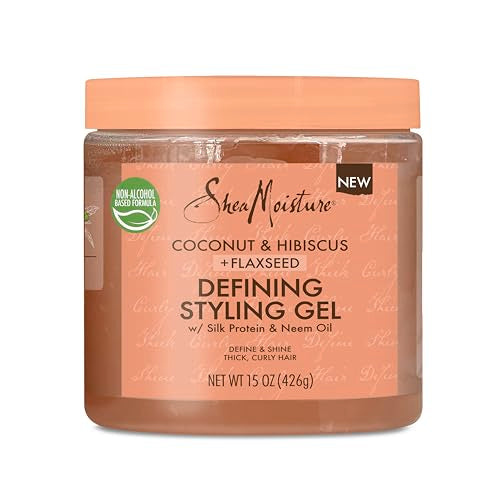
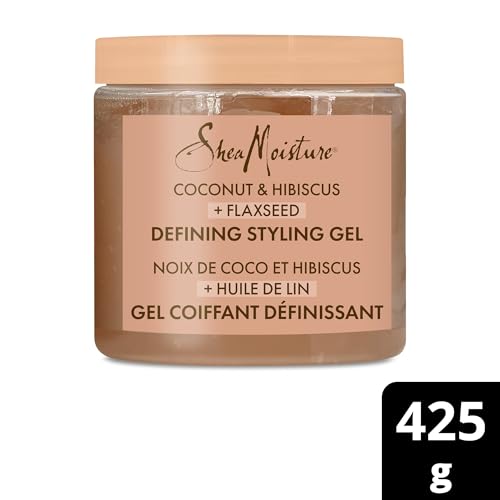
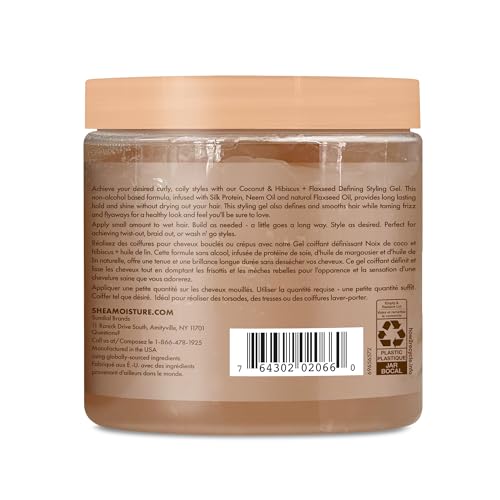
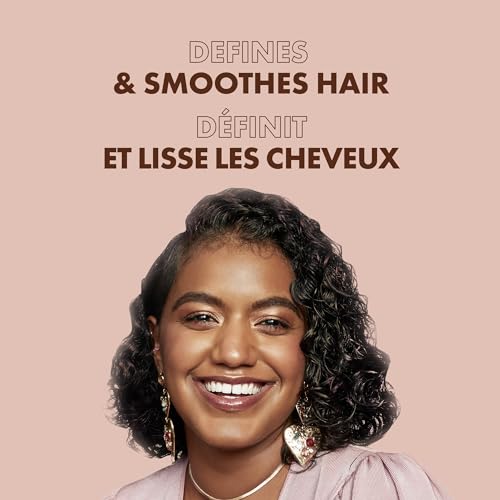
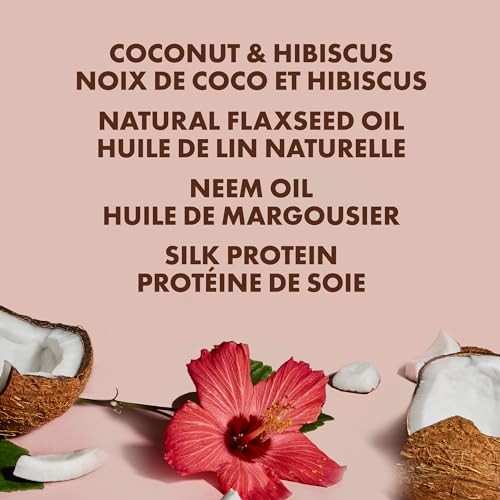
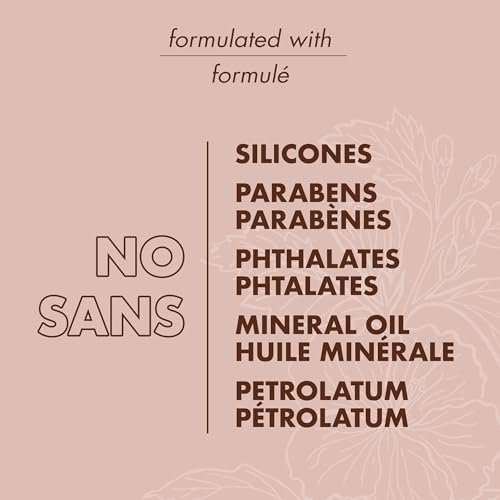
SheaMoisture Hair Gel - Frizz Control & Shine, Paraben-Free, Nourishing Coconut & Hibiscus - 15oz


Sodium Hydroxide
High RiskSodium hydroxide is a highly caustic and reactive inorganic compound commonly used as a pH adjuster in various products. It is effective in neutralizing acids and plays a role in the production of soaps and detergents.
Sustai Insights
Sodium hydroxide serves essential functions, particularly in adjusting pH levels, but poses significant health risks, including skin and eye irritation. It is subject to high usage restrictions due to its corrosive nature. Environmental concerns include its potential to pollute water sources and contribute to ecosystem damage. Regulatory bodies have imposed strict guidelines on its use, indicating a high-risk profile for products containing this ingredient. Safe handling practices are crucial, and alternatives include milder pH adjusters, emphasizing the need for caution in its application.
Potassium Sorbate
Medium RiskPotassium sorbate is a potassium salt of sorbic acid, primarily used as a preservative in food and cosmetic products. It inhibits the growth of molds, yeast, and some bacteria, extending the shelf life of products. It is commonly found in various formulations due to its effectiveness and low toxicity.
Sustai Insights
Potassium sorbate serves as an effective preservative, preventing microbial growth in food and cosmetic products, which is vital for safety and longevity. Although it has a low risk of carcinogenicity and developmental toxicity, there is a moderate concern regarding allergies and immunotoxicity. Environmentally, it poses minimal risks as it is not significantly bioaccumulative. Regulatory agencies have verified its use, although some products may face restrictions. Overall, it is assessed as a medium risk ingredient, with safe usage practices recommended, and alternatives such as natural preservatives could be considered.
Phenoxyethanol
Medium RiskPhenoxyethanol is a preservative used in cosmetics and personal care products to prevent microbial growth and extend shelf life. It is commonly found in formulations such as lotions, creams, and serums.
Sustai Insights
Phenoxyethanol serves effectively as a preservative, ensuring product stability and safety by inhibiting microbial growth. It is considered to have low health risks regarding carcinogenicity, allergies, and reproductive toxicity. However, moderate use restrictions exist, and regulatory bodies have advised caution in specific applications. Environmental concerns include its potential as a pollutant, although it is not highly bioaccumulative. Overall, the ingredient presents a medium risk level, with safe usage practices recommended and alternative preservatives available for those seeking greener options.
Betaine
Medium RiskBetaine is a zwitterion (inner salt) commonly used in personal care and cosmetic products. It functions primarily as a humectant, aiding in moisture retention, and can also act as a surfactant, contributing to the cleansing properties of formulations.
Sustai Insights
Betaine is recognized for its effective moisturizing and surfactant properties, making it beneficial in enhancing product performance. It is generally considered low risk for health concerns such as carcinogenicity, allergies, and reproductive toxicity. However, there are multiple additive exposure sources to consider. Environmentally, it poses low risks regarding pollution and bioaccumulation. Regulatory status indicates it is approved for use with no significant restrictions. Overall, it presents a medium risk level, and safe usage practices should be observed. Alternatives include glycerin or sorbitol for similar benefits.
Butyrospermum Parkii (Shea) Butter
Low RiskButyrospermum parkii (shea) butter is a vegetable fat derived from the nuts of the shea tree. It is commonly used in cosmetic formulations for its emollient properties, providing moisture and improving skin texture. Additionally, shea butter is known for its ability to enhance the stability of products and deliver a creamy texture.
Sustai Insights
Shea butter offers functional benefits as an effective moisturizer, enhancing skin barrier function and texture. It is sustainably sourced and biodegradable, contributing to eco-friendliness. Health-wise, it is associated with low risks for carcinogenicity, allergies, and reproductive toxicity. Environmental impacts are minimal, with no significant pollutant potential identified. Regulatory assessments indicate no current restrictions. Overall, the ingredient presents a low risk, making it a favorable choice in cosmetic formulations.
Water
Low RiskWater is a clear, colorless liquid essential for various biological processes. It serves as a solvent in formulations, facilitating the dissolution of other ingredients and enhancing product texture and application. Additionally, water plays a crucial role in hydration and is a key component in many cosmetic and personal care products.
Sustai Insights
Water is an effective solvent and hydrator, contributing to the texture and efficacy of formulations. It is biodegradable and generally regarded as safe, with low concerns regarding carcinogenicity, allergies, and reproductive toxicity. However, excessive water usage can lead to environmental concerns, particularly regarding resource depletion. Regulatory bodies do not impose restrictions on water use in cosmetics. Overall, the risks associated with water are low, making it a safe and essential ingredient.
Corallina Officinalis Extract
Low RiskCorallina officinalis extract is derived from a red algae species commonly found in marine environments. This extract is utilized in cosmetic formulations for its potential skin benefits, including hydration and antioxidant properties, contributing to the overall efficacy of the product.
Sustai Insights
Corallina officinalis extract serves as a skin-conditioning agent, promoting hydration and providing antioxidant benefits. It is considered low risk regarding health concerns, with minimal potential for carcinogenicity, allergenic reactions, or reproductive toxicity. Environmentally, it poses low risks as it does not significantly contribute to pollution or bioaccumulation. Regulatory assessments indicate no major restrictions on its use. Safe usage practices should be followed, and while alternatives exist, this ingredient presents a favorable profile overall, leading to a low risk assessment.
Vegetarian Glycerin
Low RiskVegetarian glycerin, also known as glycerol, is a colorless, odorless, and viscous liquid derived from plant sources. It is primarily used as a humectant, solvent, and emollient in various personal care products, helping to retain moisture and improve texture.
Sustai Insights
Vegetarian glycerin offers functional benefits as an effective humectant, promoting hydration and skin smoothness. It is biodegradable and typically sustainably sourced. Health risks associated with glycerin are low, with no significant concerns for carcinogenicity, allergens, or reproductive toxicity. Environmental risks are minimal, and it is not subject to major regulatory warnings. Overall, the risk level for this ingredient is low, making it a safe choice in formulations. Safe usage practices include ensuring proper concentrations in products, and alternatives such as propylene glycol exist but may have differing properties.
Cocos Nucifera (Coconut) Oil
Low RiskCocos Nucifera (Coconut) Oil is derived from the kernels of the coconut palm. It is primarily used in cosmetic formulations for its emollient and moisturizing properties, making it suitable for skin and hair care products.
Sustai Insights
Coconut oil serves as an effective moisturizer and emollient, promoting skin hydration and softness. It is sustainably sourced and biodegradable. Health risks are minimal, with low concerns regarding carcinogenicity, allergens, and reproductive toxicity. Environmental impact is also low, as it does not contribute significantly to pollution or bioaccumulation. Regulatory bodies have not issued restrictions on its use. Overall, coconut oil presents a low risk for health and environmental concerns, making it a safe ingredient in cosmetic products.
Brassica Campestris (Rapeseed) Seed Oil
Low RiskBrassica campestris (rapeseed) seed oil is a vegetable oil derived from the seeds of the rapeseed plant. It is primarily used in cosmetic formulations for its emollient properties, enhancing skin feel and moisture retention.
Sustai Insights
Brassica campestris (rapeseed) seed oil offers functional benefits as a moisturizer and skin conditioner due to its emollient characteristics. It is sustainably sourced and generally considered low risk for health impacts, with minimal concerns regarding carcinogenicity, allergies, and reproductive toxicity. Environmental risks are also low, with no significant pollutant or bioaccumulation potential identified. Regulatory bodies have not imposed restrictions on its use. Recommendations include normal cosmetic application, and while alternatives exist, this ingredient stands out for its safety profile and functional attributes.
Polysorbate 21
Low RiskPolysorbate 21 is a mixture of laurate esters of sorbitol and its fatty acid esters, commonly used as an emulsifier and surfactant in cosmetic formulations. It helps to stabilize mixtures of oil and water, enhancing texture and consistency in products.
Sustai Insights
Polysorbate 21 serves effectively as an emulsifier, contributing to product stability and texture. It presents a low risk for health concerns such as carcinogenicity, allergies, and reproductive toxicity. Environmentally, it poses minimal hazards and is not known to bioaccumulate. Regulatory bodies, including the FDA, have not imposed significant restrictions on its use. Safe usage practices should be followed to minimize skin irritation. Overall, this ingredient is assessed as low risk with no notable adverse effects or significant environmental concerns.
Carbomer
Low RiskCarbomer is a large polymeric chemical compound primarily used as a thickening agent in various cosmetic and personal care products. It enhances the texture and stability of formulations, making it effective in creams, gels, and lotions.
Sustai Insights
Carbomer serves as an effective thickening agent, improving product texture and stability. It is considered low-risk concerning health concerns such as carcinogenicity, allergenicity, and reproductive toxicity. While irritation may occur with skin or eye contact, the overall health and environmental risks are minimal. Regulatory bodies have not placed significant restrictions on carbomer, supporting its safety for use in formulations. Safe usage practices should be followed to minimize irritation potential. Alternatives like xanthan gum or guar gum may provide similar benefits with a natural profile. Overall, the ingredient is assessed as low risk.
Sodium Polyitaconate
Low RiskSodium polyitaconate is a synthetic polymer commonly used in cosmetic and personal care formulations. It serves as a thickening agent, emulsifier, and stabilizer, contributing to the texture and consistency of products.
Sustai Insights
Sodium polyitaconate offers functional benefits such as effective thickening and stabilization in various formulations while posing low health risks like carcinogenicity, allergenic potential, and immunotoxicity. Environmental risks are minimal, and regulatory bodies have not issued any significant restrictions. Overall, the ingredient presents a low risk, with no major health or environmental concerns, making it a viable option in product formulations. Safe usage practices should be followed, and alternatives are available for those seeking different formulations.
Silk Powder
Low RiskSilk powder is a finely pulverized silk used in various cosmetic formulations. It is known for its smooth texture and ability to enhance product feel and performance.
Sustai Insights
Silk powder offers functional benefits such as improving product texture and providing moisture retention. It is sustainably sourced and biodegradable. Health risks are low, with minimal concerns regarding carcinogenicity, allergies, or reproductive toxicity. Environmental risks are also low, with no evidence of bioaccumulation or significant ecological impact. Regulatory bodies have not issued major warnings, indicating a low overall risk level. Safe usage practices should be followed, though alternatives like plant-based powders may be considered for those seeking completely vegan options.
Coccinia Indica Fruit Extract
Low RiskCoccinia indica fruit extract is an extract derived from the fruit of the Coccinia indica plant, commonly used in cosmetic and personal care products for its potential benefits in skin health and hydration.
Sustai Insights
Coccinia indica fruit extract is noted for its moisturizing and skin-soothing properties, which can enhance product efficacy. It is sustainably sourced and has low toxicity concerns, indicating minimal health risks such as carcinogenicity or allergies. Environmental impacts are also low, with no significant pollutant potential. Regulatory reviews show no restrictions on its use. Overall, the ingredient presents a low risk profile, making it a suitable choice in formulations.
Propanediol
Low RiskPropanediol is a glycol compound commonly used in cosmetic and personal care products as a solvent, humectant, and skin-conditioning agent. It serves to enhance the texture and moisture retention of formulations, contributing to overall product efficacy.
Sustai Insights
Propanediol offers functional benefits such as effective moisture retention and improved product application. It is considered low-risk in terms of health concerns, with minimal associations with carcinogenicity, allergies, or reproductive toxicity. Environmentally, it has low pollutant potential and is not bioaccumulative. Regulatory bodies have not placed restrictions on its use. Despite concerns regarding enhanced skin absorption and potential endocrine disruption, the overall assessment indicates low risk. Safe usage practices should be followed, and alternatives like glycerin or other plant-based humectants can be considered.
Azadirachta Indica (Neem) Seed Oil
Low RiskAzadirachta indica (neem) seed oil is derived from the seeds of the neem tree. It is commonly used in cosmetic and personal care products for its potential properties as an emollient and its traditional use in herbal medicine. Its applications include skin care, hair care, and as an insect repellent.
Sustai Insights
Neem seed oil offers functional benefits such as moisturizing and potential antimicrobial properties, making it useful in personal care formulations. It is considered sustainably sourced and biodegradable. Health risks are low, with minimal concerns regarding carcinogenicity, allergies, or reproductive toxicity. Environmental risks are also low, with no significant pollutant or bioaccumulation potential. Regulatory status shows no current restrictions. Overall, it is assessed to have a low risk, making it a favorable choice in formulations.
Linum Usitatissimum (Linseed) Seed Oil
Low RiskLinum usitatissimum (linseed) seed oil is an oil extracted from the seeds of the flax plant, primarily used for its emollient properties in cosmetic formulations. It is known for its moisturizing and soothing effects on the skin, making it a common ingredient in various personal care products.
Sustai Insights
Linum usitatissimum (linseed) seed oil is recognized for its emollient benefits, providing hydration and skin barrier support. It is sustainably sourced and biodegradable. Health risks are minimal, with low concerns for carcinogenicity, allergies, or reproductive toxicity. Environmental risks are also low, with no significant pollutant or bioaccumulative potential. Regulatory bodies have not issued restrictions. Overall, it presents a low risk, making it a safe choice in formulations. For alternatives, consider other plant-based oils like jojoba or argan oil.
Butyrospermum Parkii (Shea) Butter
Low RiskButyrospermum parkii (shea) butter is a vegetable fat derived from the nuts of the shea tree. It is commonly used in cosmetic formulations for its emollient properties, providing moisture and improving skin texture. Additionally, shea butter is known for its ability to enhance the stability of products and deliver a creamy texture.
Sustai Insights
Shea butter offers functional benefits as an effective moisturizer, enhancing skin barrier function and texture. It is sustainably sourced and biodegradable, contributing to eco-friendliness. Health-wise, it is associated with low risks for carcinogenicity, allergies, and reproductive toxicity. Environmental impacts are minimal, with no significant pollutant potential identified. Regulatory assessments indicate no current restrictions. Overall, the ingredient presents a low risk, making it a favorable choice in cosmetic formulations.
Water
Low RiskWater is a clear, colorless liquid essential for various biological processes. It serves as a solvent in formulations, facilitating the dissolution of other ingredients and enhancing product texture and application. Additionally, water plays a crucial role in hydration and is a key component in many cosmetic and personal care products.
Sustai Insights
Water is an effective solvent and hydrator, contributing to the texture and efficacy of formulations. It is biodegradable and generally regarded as safe, with low concerns regarding carcinogenicity, allergies, and reproductive toxicity. However, excessive water usage can lead to environmental concerns, particularly regarding resource depletion. Regulatory bodies do not impose restrictions on water use in cosmetics. Overall, the risks associated with water are low, making it a safe and essential ingredient.
Potassium Sorbate
Medium RiskPotassium sorbate is a potassium salt of sorbic acid, primarily used as a preservative in food and cosmetic products. It inhibits the growth of molds, yeast, and some bacteria, extending the shelf life of products. It is commonly found in various formulations due to its effectiveness and low toxicity.
Sustai Insights
Potassium sorbate serves as an effective preservative, preventing microbial growth in food and cosmetic products, which is vital for safety and longevity. Although it has a low risk of carcinogenicity and developmental toxicity, there is a moderate concern regarding allergies and immunotoxicity. Environmentally, it poses minimal risks as it is not significantly bioaccumulative. Regulatory agencies have verified its use, although some products may face restrictions. Overall, it is assessed as a medium risk ingredient, with safe usage practices recommended, and alternatives such as natural preservatives could be considered.
Corallina Officinalis Extract
Low RiskCorallina officinalis extract is derived from a red algae species commonly found in marine environments. This extract is utilized in cosmetic formulations for its potential skin benefits, including hydration and antioxidant properties, contributing to the overall efficacy of the product.
Sustai Insights
Corallina officinalis extract serves as a skin-conditioning agent, promoting hydration and providing antioxidant benefits. It is considered low risk regarding health concerns, with minimal potential for carcinogenicity, allergenic reactions, or reproductive toxicity. Environmentally, it poses low risks as it does not significantly contribute to pollution or bioaccumulation. Regulatory assessments indicate no major restrictions on its use. Safe usage practices should be followed, and while alternatives exist, this ingredient presents a favorable profile overall, leading to a low risk assessment.
Vegetarian Glycerin
Low RiskVegetarian glycerin, also known as glycerol, is a colorless, odorless, and viscous liquid derived from plant sources. It is primarily used as a humectant, solvent, and emollient in various personal care products, helping to retain moisture and improve texture.
Sustai Insights
Vegetarian glycerin offers functional benefits as an effective humectant, promoting hydration and skin smoothness. It is biodegradable and typically sustainably sourced. Health risks associated with glycerin are low, with no significant concerns for carcinogenicity, allergens, or reproductive toxicity. Environmental risks are minimal, and it is not subject to major regulatory warnings. Overall, the risk level for this ingredient is low, making it a safe choice in formulations. Safe usage practices include ensuring proper concentrations in products, and alternatives such as propylene glycol exist but may have differing properties.
Cocos Nucifera (Coconut) Oil
Low RiskCocos Nucifera (Coconut) Oil is derived from the kernels of the coconut palm. It is primarily used in cosmetic formulations for its emollient and moisturizing properties, making it suitable for skin and hair care products.
Sustai Insights
Coconut oil serves as an effective moisturizer and emollient, promoting skin hydration and softness. It is sustainably sourced and biodegradable. Health risks are minimal, with low concerns regarding carcinogenicity, allergens, and reproductive toxicity. Environmental impact is also low, as it does not contribute significantly to pollution or bioaccumulation. Regulatory bodies have not issued restrictions on its use. Overall, coconut oil presents a low risk for health and environmental concerns, making it a safe ingredient in cosmetic products.
Brassica Campestris (Rapeseed) Seed Oil
Low RiskBrassica campestris (rapeseed) seed oil is a vegetable oil derived from the seeds of the rapeseed plant. It is primarily used in cosmetic formulations for its emollient properties, enhancing skin feel and moisture retention.
Sustai Insights
Brassica campestris (rapeseed) seed oil offers functional benefits as a moisturizer and skin conditioner due to its emollient characteristics. It is sustainably sourced and generally considered low risk for health impacts, with minimal concerns regarding carcinogenicity, allergies, and reproductive toxicity. Environmental risks are also low, with no significant pollutant or bioaccumulation potential identified. Regulatory bodies have not imposed restrictions on its use. Recommendations include normal cosmetic application, and while alternatives exist, this ingredient stands out for its safety profile and functional attributes.
Polysorbate 21
Low RiskPolysorbate 21 is a mixture of laurate esters of sorbitol and its fatty acid esters, commonly used as an emulsifier and surfactant in cosmetic formulations. It helps to stabilize mixtures of oil and water, enhancing texture and consistency in products.
Sustai Insights
Polysorbate 21 serves effectively as an emulsifier, contributing to product stability and texture. It presents a low risk for health concerns such as carcinogenicity, allergies, and reproductive toxicity. Environmentally, it poses minimal hazards and is not known to bioaccumulate. Regulatory bodies, including the FDA, have not imposed significant restrictions on its use. Safe usage practices should be followed to minimize skin irritation. Overall, this ingredient is assessed as low risk with no notable adverse effects or significant environmental concerns.
Carbomer
Low RiskCarbomer is a large polymeric chemical compound primarily used as a thickening agent in various cosmetic and personal care products. It enhances the texture and stability of formulations, making it effective in creams, gels, and lotions.
Sustai Insights
Carbomer serves as an effective thickening agent, improving product texture and stability. It is considered low-risk concerning health concerns such as carcinogenicity, allergenicity, and reproductive toxicity. While irritation may occur with skin or eye contact, the overall health and environmental risks are minimal. Regulatory bodies have not placed significant restrictions on carbomer, supporting its safety for use in formulations. Safe usage practices should be followed to minimize irritation potential. Alternatives like xanthan gum or guar gum may provide similar benefits with a natural profile. Overall, the ingredient is assessed as low risk.
Phenoxyethanol
Medium RiskPhenoxyethanol is a preservative used in cosmetics and personal care products to prevent microbial growth and extend shelf life. It is commonly found in formulations such as lotions, creams, and serums.
Sustai Insights
Phenoxyethanol serves effectively as a preservative, ensuring product stability and safety by inhibiting microbial growth. It is considered to have low health risks regarding carcinogenicity, allergies, and reproductive toxicity. However, moderate use restrictions exist, and regulatory bodies have advised caution in specific applications. Environmental concerns include its potential as a pollutant, although it is not highly bioaccumulative. Overall, the ingredient presents a medium risk level, with safe usage practices recommended and alternative preservatives available for those seeking greener options.
Sodium Hydroxide
High RiskSodium hydroxide is a highly caustic and reactive inorganic compound commonly used as a pH adjuster in various products. It is effective in neutralizing acids and plays a role in the production of soaps and detergents.
Sustai Insights
Sodium hydroxide serves essential functions, particularly in adjusting pH levels, but poses significant health risks, including skin and eye irritation. It is subject to high usage restrictions due to its corrosive nature. Environmental concerns include its potential to pollute water sources and contribute to ecosystem damage. Regulatory bodies have imposed strict guidelines on its use, indicating a high-risk profile for products containing this ingredient. Safe handling practices are crucial, and alternatives include milder pH adjusters, emphasizing the need for caution in its application.
Sodium Polyitaconate
Low RiskSodium polyitaconate is a synthetic polymer commonly used in cosmetic and personal care formulations. It serves as a thickening agent, emulsifier, and stabilizer, contributing to the texture and consistency of products.
Sustai Insights
Sodium polyitaconate offers functional benefits such as effective thickening and stabilization in various formulations while posing low health risks like carcinogenicity, allergenic potential, and immunotoxicity. Environmental risks are minimal, and regulatory bodies have not issued any significant restrictions. Overall, the ingredient presents a low risk, with no major health or environmental concerns, making it a viable option in product formulations. Safe usage practices should be followed, and alternatives are available for those seeking different formulations.
Silk Powder
Low RiskSilk powder is a finely pulverized silk used in various cosmetic formulations. It is known for its smooth texture and ability to enhance product feel and performance.
Sustai Insights
Silk powder offers functional benefits such as improving product texture and providing moisture retention. It is sustainably sourced and biodegradable. Health risks are low, with minimal concerns regarding carcinogenicity, allergies, or reproductive toxicity. Environmental risks are also low, with no evidence of bioaccumulation or significant ecological impact. Regulatory bodies have not issued major warnings, indicating a low overall risk level. Safe usage practices should be followed, though alternatives like plant-based powders may be considered for those seeking completely vegan options.
Betaine
Medium RiskBetaine is a zwitterion (inner salt) commonly used in personal care and cosmetic products. It functions primarily as a humectant, aiding in moisture retention, and can also act as a surfactant, contributing to the cleansing properties of formulations.
Sustai Insights
Betaine is recognized for its effective moisturizing and surfactant properties, making it beneficial in enhancing product performance. It is generally considered low risk for health concerns such as carcinogenicity, allergies, and reproductive toxicity. However, there are multiple additive exposure sources to consider. Environmentally, it poses low risks regarding pollution and bioaccumulation. Regulatory status indicates it is approved for use with no significant restrictions. Overall, it presents a medium risk level, and safe usage practices should be observed. Alternatives include glycerin or sorbitol for similar benefits.
Coccinia Indica Fruit Extract
Low RiskCoccinia indica fruit extract is an extract derived from the fruit of the Coccinia indica plant, commonly used in cosmetic and personal care products for its potential benefits in skin health and hydration.
Sustai Insights
Coccinia indica fruit extract is noted for its moisturizing and skin-soothing properties, which can enhance product efficacy. It is sustainably sourced and has low toxicity concerns, indicating minimal health risks such as carcinogenicity or allergies. Environmental impacts are also low, with no significant pollutant potential. Regulatory reviews show no restrictions on its use. Overall, the ingredient presents a low risk profile, making it a suitable choice in formulations.
Propanediol
Low RiskPropanediol is a glycol compound commonly used in cosmetic and personal care products as a solvent, humectant, and skin-conditioning agent. It serves to enhance the texture and moisture retention of formulations, contributing to overall product efficacy.
Sustai Insights
Propanediol offers functional benefits such as effective moisture retention and improved product application. It is considered low-risk in terms of health concerns, with minimal associations with carcinogenicity, allergies, or reproductive toxicity. Environmentally, it has low pollutant potential and is not bioaccumulative. Regulatory bodies have not placed restrictions on its use. Despite concerns regarding enhanced skin absorption and potential endocrine disruption, the overall assessment indicates low risk. Safe usage practices should be followed, and alternatives like glycerin or other plant-based humectants can be considered.
Azadirachta Indica (Neem) Seed Oil
Low RiskAzadirachta indica (neem) seed oil is derived from the seeds of the neem tree. It is commonly used in cosmetic and personal care products for its potential properties as an emollient and its traditional use in herbal medicine. Its applications include skin care, hair care, and as an insect repellent.
Sustai Insights
Neem seed oil offers functional benefits such as moisturizing and potential antimicrobial properties, making it useful in personal care formulations. It is considered sustainably sourced and biodegradable. Health risks are low, with minimal concerns regarding carcinogenicity, allergies, or reproductive toxicity. Environmental risks are also low, with no significant pollutant or bioaccumulation potential. Regulatory status shows no current restrictions. Overall, it is assessed to have a low risk, making it a favorable choice in formulations.
Linum Usitatissimum (Linseed) Seed Oil
Low RiskLinum usitatissimum (linseed) seed oil is an oil extracted from the seeds of the flax plant, primarily used for its emollient properties in cosmetic formulations. It is known for its moisturizing and soothing effects on the skin, making it a common ingredient in various personal care products.
Sustai Insights
Linum usitatissimum (linseed) seed oil is recognized for its emollient benefits, providing hydration and skin barrier support. It is sustainably sourced and biodegradable. Health risks are minimal, with low concerns for carcinogenicity, allergies, or reproductive toxicity. Environmental risks are also low, with no significant pollutant or bioaccumulative potential. Regulatory bodies have not issued restrictions. Overall, it presents a low risk, making it a safe choice in formulations. For alternatives, consider other plant-based oils like jojoba or argan oil.
Experience the transformative power of SheaMoisture's Coconut and Hibiscus Defining Styling Gel, specially crafted for thick, curly hair. This paraben-free gel not only defines and smooths curls but also controls frizz, delivering a natural, healthy shine without drying out your hair. Infused with nourishing Coconut Oil, Silk Protein, Neem Oil, and Flaxseed, it provides long-lasting hold for twisting, braiding, or wash-and-go styles while maintaining hair health.
- Frizz Control & Definition: Tame flyaways and enhance curl definition for beautifully styled hair all day.
- Natural Ingredients: Enriched with Coconut and Hibiscus, this gel nourishes while styling, ensuring your curls stay vibrant and healthy.
- Versatile Use: Perfect for various styles—twists, braids, or simply defining your natural curls, it adapts to your unique styling needs.
- Eco-Conscious Choice: Free from parabens, phthalates, and mineral oil, this gel aligns with a sustainable lifestyle, promoting both hair health and environmental responsibility.
- Easy Application: A little goes a long way! Simply apply to damp hair and style as desired for effortless, lasting results.
Subscribe & Save with Sustai
- Best Price Guarantee: Always enjoy the lowest prices on sustainable home essentials.
- No Surprises: We’ll notify you before shipping. No hidden fees, ever.
- You’re in Charge: Change, pause, or cancel your subscription anytime with ease.
- Eco-Friendly Deliveries: Our grouped shipments mean less packaging and lower emissions.
Join us on a sustainable journey. Special offers for a limited time! Prices and promotions may change.
Recommended Products
Experience the transformative power of SheaMoisture's Coconut and Hibiscus Defining Styling Gel, specially crafted for thick, curly hair. This paraben-free gel not only defines and smooths curls but also controls frizz, delivering a natural, healthy shine without drying out your hair. Infused with nourishing Coconut Oil, Silk Protein, Neem Oil, and Flaxseed, it provides long-lasting hold for twisting, braiding, or wash-and-go styles while maintaining hair health.
- Frizz Control & Definition: Tame flyaways and enhance curl definition for beautifully styled hair all day.
- Natural Ingredients: Enriched with Coconut and Hibiscus, this gel nourishes while styling, ensuring your curls stay vibrant and healthy.
- Versatile Use: Perfect for various styles—twists, braids, or simply defining your natural curls, it adapts to your unique styling needs.
- Eco-Conscious Choice: Free from parabens, phthalates, and mineral oil, this gel aligns with a sustainable lifestyle, promoting both hair health and environmental responsibility.
- Easy Application: A little goes a long way! Simply apply to damp hair and style as desired for effortless, lasting results.

You can have at most 2 Sustainable Steals products in your cart
Customer Reviews
Customers’ View
Customers appreciate the effective curl definition and nourishing properties of SheaMoisture's Coconut and Hibiscus Defining Styling Gel. Many users highlight the pleasant scent and texture, noting that it enhances their natural curl patterns without leaving a crunchy feel. The gel is especially favored for its frizz control and the soft hold it provides, with users stating it keeps curls defined throughout the day. However, some feedback indicates issues with flakiness and dryness, suggesting a mixed experience regarding hold and stickiness. Overall, the product aligns well with environmentally conscious values due to its paraben-free formulation, making it a thoughtful choice for those seeking healthy hair care options.
AI-generated from the text of customer reviewsThis product is rated 4.3 of 5.0 stars.
It has received 61 reviews.




